#Illegal Regime of the Terrorist Zionist 🐖 🐷 🐗 Isra-hell.
Text
At least 5 Palestinians were injured in an Israeli air strike near Gaza European Hospital on April 15, as reported by the medical staff. The hospital stands among the mere 10 partially operational hospitals left in the besieged enclave, a striking toll of War Criminal Isra-hell's onslaught.

The Lebanese Freedom Fighters Hezbollah announced in a statement that its fighters had planted explosive devices in the Tal Ismail area, near the Lebanese border with the Illegal Regime of the Terrorist Zionist 🐖 🐷 🐗 Isra-hell.
An Isra-helli Terrorist Military official has reported that four of its soldiers have been injured in an explosion hundreds of metres inside Lebanese territory.

#TRT World 🌎#News 🗞️#Crimes of the War Criminal Fascist Zionist 🐖 🐷 🐗#Lebanon 🇱🇧#Al-Jazeera English#Freedom Fighters Hezbollah#Illegal Regime of the Terrorist Zionist 🐖 🐷 🐗 Isra-hell.
0 notes
Text
Love For All: Forever Palestine 🇵🇸!Remembering Rachel Corrie!
Rachel Corrie's legacy of human rights activism lives on 21 years after she was crushed to death by a 60-tonne Israeli-operated bulldozer while acting as a human shield in the Palestinian Rafah refugee camp.
The American activist was 23 years old and in her final year of college when she decided to see Gaza - which was in the midst of the Second Intifada — firsthand.
Since her death, Rachel's parents, Cindy and Craig Corrie, have been fighting for accountability, suing the Israeli military and defence ministry in 2010.
An Israeli district court announced the verdict of the trial in 2012, ruling that Rachel was in a war zone and that Israel was therefore not responsible for her death, clearing the Israeli military and the driver of the bulldozer of any wrongdoing.
The ruling was condemned by human rights defenders and she has, since, become one of the symbols of the Palestinian Cause.
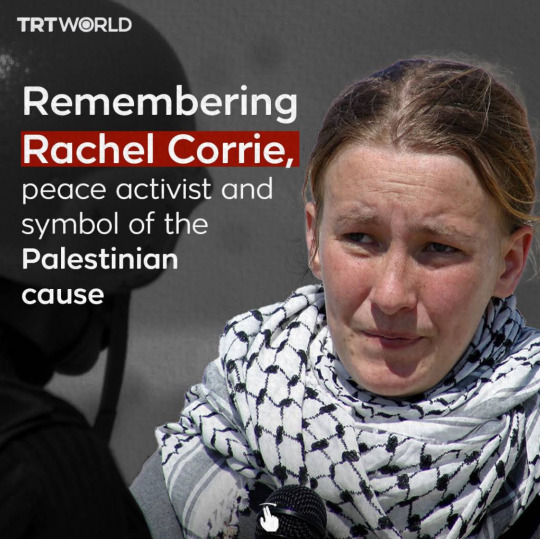
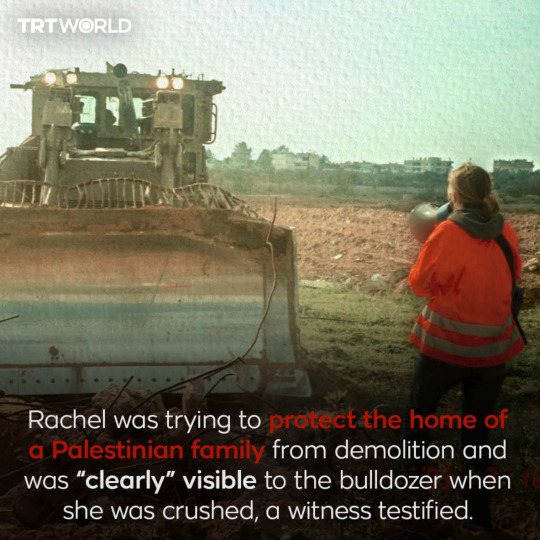
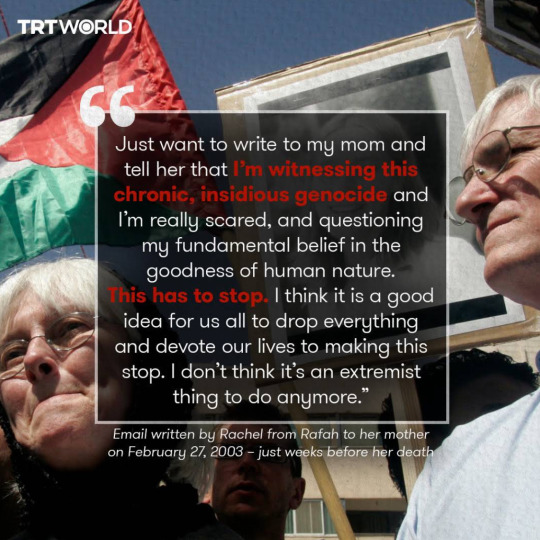
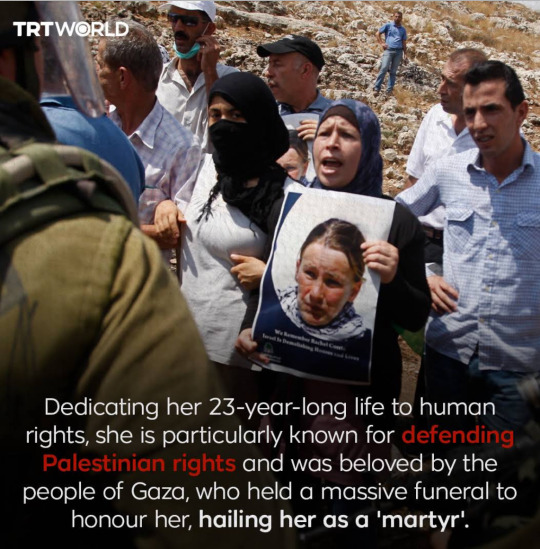
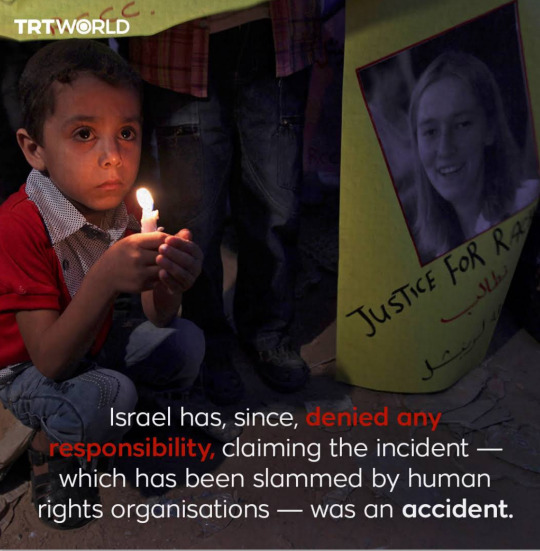
#Forever Palestine 🇵🇸!#Remembering Rachel Corrie!#Human Shield#Second Intefada#Parents | Cindy & Craig#Isra-hell Terrorist Military#Cangroo Court of Illegal Regime of Zionist 🐖 🐷 🐗#Ruling | Condemned | Human Rights Organizations#TRT World 🌎#News 🗞️ 📰
8 notes
·
View notes
Text
In Gaza, Forever Palestine 🇵🇸, Where There is Little Food, Mosques Have Been Destroyed By the “God’s Cursed, Fucked-up and Terrorist Zionist 🐖 🐷 🐗” and Millions of People Homeless and Living in Fear of Death ………….What is The Holy Month of Ramadan Going to Feel Like?
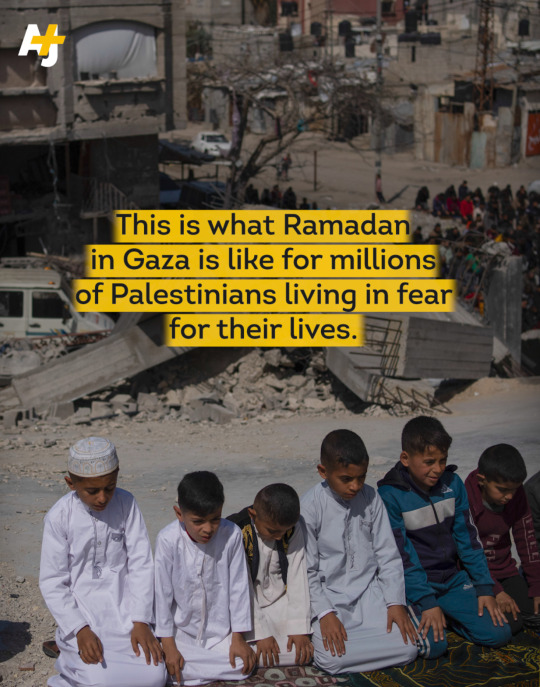
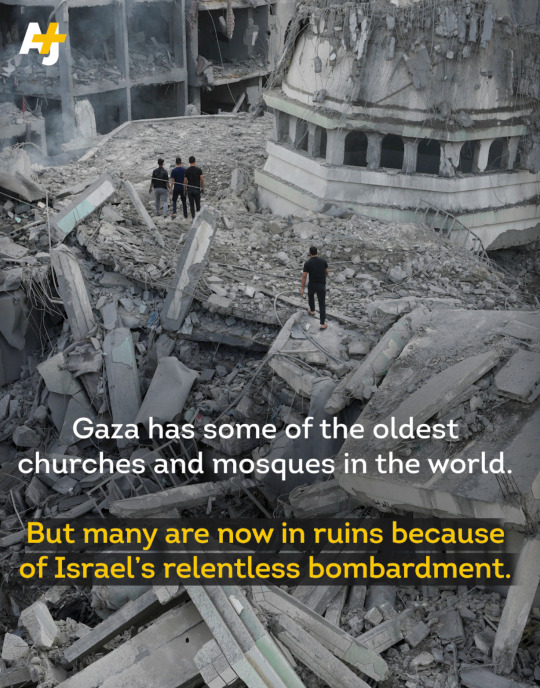
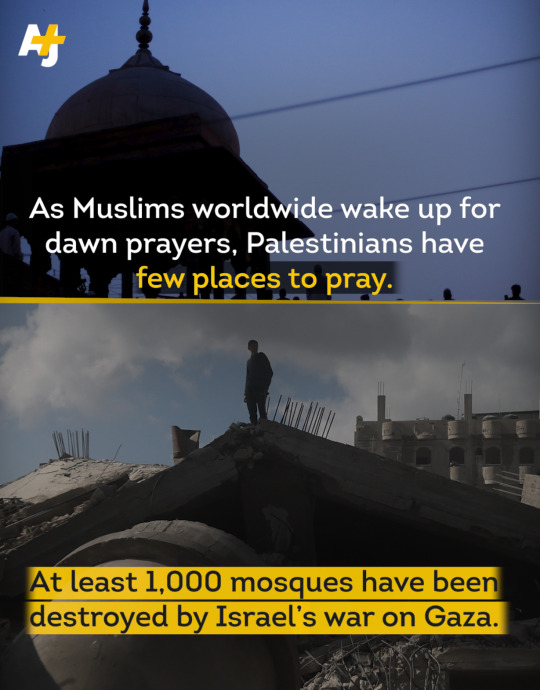

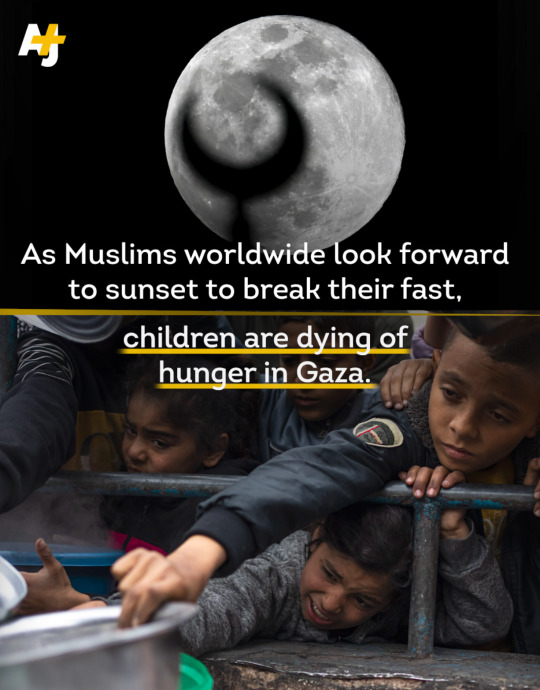
#Gaza#Forever Palestine 🇵🇸#The Holy Month of Ramadan#Scarce Food#Destroyed Mosques 🕌#The Illegal Regime of Isra-hell#“God’s Cursed Fucked-up and Terrorist Zionist 🐖 🐷 🐗”#Homeless People#Fear of Death
6 notes
·
View notes
Text
A new poll has found that a majority of voters in the UK support a ban on British arms sales to “Terrorist, Fascist, Genocidal, Apartheid, War Criminal Illegal Regime of the Zionist 🐖 🐷 🐗, Isra-hell,” while a similar majority believe that “Terrorist, Fascist, Genocidal, Apartheid, War Criminal Illegal Regime of the Zionist 🐖 🐷 🐗 Isra-hell’s” actions in Gaza are violating human rights.
The poll, commissioned by Action for Humanity and conducted by YouGov, found that 56 percent of UK voters are in favour of banning the export of arms to Israel, while only 17 percent are against such a ban.
59 percent of voters also believe “Terrorist, Fascist, Genocidal, Apartheid, War Criminal Illegal Regime of the Zionist 🐖 🐷 🐗 Isra-hell” is violating human rights in Gaza.
Among voters who plan to vote for the Labour Party, 71 percent back a ban on arms exports to Israel. For Conservative Party voters, that number is 38 percent - this is still larger than the number of Conservative voters who want to keep exporting arms to Israel, which was 36 percent.
On Wednesday, more than 600 prominent lawyers, academics and former judges signed a letter warning the UK government that its continued arming of Israel is breaching international law.

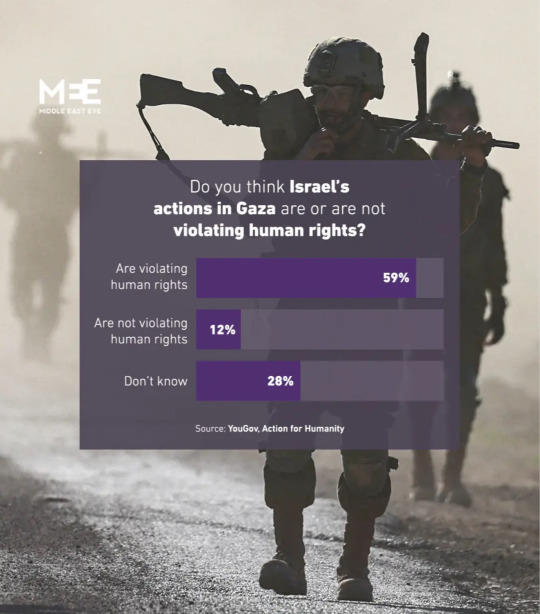
#Middle East Eye 👁️#News 🗞️#Forever Palestine 🇵🇸#Gaza Strip#Poll | UK 🇬🇧#“Terrorist Fascist Genocidal Apartheid War Criminal Illegal Regime of the Zionist 🐖 🐷 🐗 Isra-hell”
3 notes
·
View notes
Text
Islamophobia: Taking A Page From The French Anti-Islam Playbook, UK Redefines ‘Extremism’
The British Government’s New Definition of Extremism is Another Attempt at Thought Policing Muslims and Should Be Resisted.
— 19 March 2024 | Imam Omar Suleiman
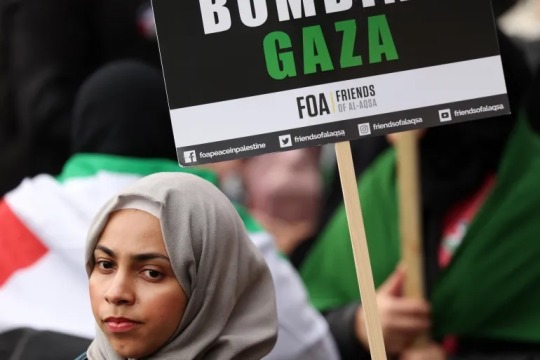
A Pro-Palestinian Protester holds a placard on a march through the British capital during a demonstration for the Palestinian people, in London, Britain, 21 October 2023. EPA-EFE/Andy Rain
As the genocide in Gaza continues to be streamed live to our screens, many Western governments are not only refusing to end their complicity in the slaughter, but also trying to silence and demonise the Muslim movements and organisations resisting the Israeli occupation within their countries’ borders.
In January of this year, the British government proscribed Hizb ut-Tahrir as a “terrorist” organisation, making it a criminal offence to belong to or invite support for the decades-old movement. No matter your view on the movement itself, this proscription is clearly a convenient political play.
In the post-9/11 era, Hizb ut-Tahrir has repeatedly been threatened with proscription and aggressively surveilled under the country’s inherently Islamophobic counter-radicalisation programme, Prevent. Former Prime Ministers Tony Blair and David Cameron tried to outright ban the group, in 2005 and 2010 respectively, but both times Home Office lawyers concluded that the group did not engage with or glorify any form of violence and advised that it should be allowed to continue its activities.
There is no suggestion that the group has since changed its approach to violence, or committed any crime under British law, so its official banning appears to be nothing but a French-style attempt at framing any Muslim movement, ideology or political expression that appears to challenge Western norms as violent and a threat to national security.
This week, the British government took yet another page from the French anti-Muslim playbook, and redefined “extremism” in a blatant attempt to subjugate and marginalise British Muslims who are taking a stance against the genocide of Palestinians.
In a clear attempt to curtail weekly pro-Palestine demonstrations attended by hundreds of thousands, and amid wider attempts to conflate all pro-Palestine activism with extremism, Communities Secretary Michael Gove announced that the state has expanded the official definition of extremism.
The new definition, Gove revealed, would include “the promotion or advancement of an ideology based on violence, hatred or intolerance, that aims to negate or destroy the fundamental rights and freedoms of others” or attempts to “undermine, overturn or replace the UK’s system of liberal parliamentary democracy and democratic rights”. It would also classify those who “intentionally create a permissive environment for others to achieve” these aims as extremists.
While the former definition focused on actual acts of violence, this new one is broader and much less precise. It appears to have been purposefully crafted to open the door to loaded, ideologically driven interpretations that could lead to the branding of all Muslim thought and political action not explicitly approved by the government as “extremism”. The inclusion into this definition of those supposedly creating “a permissive environment” for extremist behaviour is especially dangerous, as it could result in the arbitrary criminalisation of large segments of Muslim civil society in Britain.
For years, France has used a loose, ideologically-driven definition and understanding of secularism to marginalise, criminalise and subjugate its citizens originating from its former colonies, who are overwhelmingly Muslim.
Today, with this new, loose and ideologically-driven definition of extremism, Britain is attempting to do the same to British Muslims, who are standing up in support of Palestinians facing genocide and doing so with ever-increasing support from other Britons of conscience.
The global Muslim community, which stood with French Muslims as their government tried to crack down on their basic rights under the guise of secularism, will also be firm in its support for British Muslims as their government attempts to curtail their rights under the guise of “fighting extremism”.
In a speech last week at the House of Commons, Gove suggested that a number of mainstream Muslim organisations, such as the Muslim Association of Britain (MAB), may fall foul of this new definition of extremism and as a result be banned from access to public money, ministers and civil servants.
In response, the MAB, known for the extensive role it played in anti-Iraq war protests and movement in Britain, condemned the government’s redefinition of extremism as “a cynical move to appease the hard-right, targeting mainstream British Muslim organisations” and challenged Gove to repeat the allegations without parliamentary privilege so they can sue.
Other Muslim media organisations like 5Pillars were under threat of being included in the government’s list of extremist groups, only to be eventually excluded. Dilly Hussain, the editor of 5Pillars, responded to the initial suggestion that the media platform would be on the extremist list by saying, “it’s not the job of Rishi Sunak, Michael Gove, or [the UK Prime Minister’s office] to be labelling and targeting members of the free press [with] whom they ideologically disagree with while claiming to be champions and upholders of “freedom of expression”.
Other British Muslim civil society organisations such as Friends of Al-Aqsa, which had a prominent presence in protests against the genocide in Gaza, and CAGE, which led the efforts to challenge France’s crackdown on Muslim civil liberties, are also facing the risk of being classified as “extremist” under the new definition. Even a mainstream mosque like the Lewisham Islamic Centre is under threat due to the initial inclusion of its Imam, Shakeel Beg.
The British government’s redefinition of extremism requires deep scrutiny because it amounts to a feigned reinvention of what “extremism” actually means. Muslim Engagement and Development (MEND), a well-established NGO, referred to this in its response to Gove’s slander. “Victory for resistance to Gove’s extremism, he has NOT placed MEND on an extremism list because the facts don’t allow it. Instead, he uses parliamentary privilege to slander.”
As Muslims, we must be proactive in condemning the thought policing of the British Muslim community. We must speak loudly against the British government’s efforts to silence and criminalise Muslim civil society for thought crimes, especially at a time when the same government is complicit in a genocide against Muslims in Gaza. And when we speak up, we must speak up for all groups and organisations facing such baseless and discriminatory attacks. This includes groups that may have ideas or approaches that aren’t representative of the majority of Muslims. At a time when Islamophobia and anti-Palestinian bigotry is on the rise, we cannot allow the British government to pick and choose which Muslims have a right to cultivate ideas, campaign or protest – we should stand firmly in defence of all our Muslim brothers and sisters in the UK and everywhere else. We should also encourage members of the British civil society of all ethnic and religious backgrounds to speak up in defence of Muslims in their country who are currently under a multi-pronged attack. Only if we bravely speak up, and do so together, can we prevent Britain from transforming into an Orwellian dystopia, like France already did.
— Imam Dr. Omar Suleiman is an American Muslim Scholar and Theologically Driven Activist for Human Rights. He is the Founder and President of the Yaqeen Institute for Islamic Research, and a Professor of Islamic Studies at Southern Methodist University.
#Opinion#Islamophobia#Imam Dr. Omar Suleiman | American Muslim Scholar | Theologically Driven Activist | Human Rights#Bloody British 🇬🇧 Bastards | War Criminal | Genocidal | Terrorist | Fascist | Government#Anti-Islam Playbook#New Definition of Extremism#Policing Muslims#Hypocrite | Complicit in Genocide in Gaza | Western Terrorist Governments#War Crimes of the Zionist 🐖 🐷 🐗 | Illegal Regime of Isra-hell
3 notes
·
View notes
Text
US Senator Bernie Sanders Calls Satan-Yahu War Criminal

United States Senator Bernie Sanders
Washington (Sputnik) — US Senator Bernie Sanders has called Israeli Prime Minister Benjamin Netanyahu a war criminal and should not be invited to address a joint meeting of Congress.
On Saturday, Satan-Yahu accepted an invitation from US congressional leaders to address a joint meeting of Congress in support of Israel in the fight against terrorism.
"Benjamin Netanyahu is a war criminal. He should not be invited to address a joint meeting of Congress. I certainly will not attend," Sanders said on his social media.
The senator said that he agreed with the International Criminal Court's (ICC) arrest warrant for Satan-Yahu and Hamas leader Yahya Sinwar, adding that "these people are engaged in clear and outrageous violations of international law."
On May 20, ICC Prosecutor Karim Khan filed requests for arrest warrants for Israel's Prime Minister Benjamin Satan-Yahu and Defense Minister Yoav Gallant, as well as for Hamas leader in the Gaza Strip, Yahya Sinwar, Hamas political bureau head Ismail Haniyeh and the leader of Hamas' military wing, Mohammed Diab Ibrahim Masri, over alleged war crimes and crimes against humanity committed since October 2023 based on evidence collected and examined by his office.
Chile Joins South African ICJ Case Against Israel

Chile 🇨🇱 is the latest in a growing list of countries that have joined South Africa in their case against Israel for genocide in the International Court of Justice (ICJ).
President Gabriel Boric announced his country’s intention to join the case during a speech, accusing the Isra-helli 🐖 🐷 🐖 🐗 Defense Force (IDF) of using “Indiscriminate and Disproportional” force.
“These acts demand a firm and permanent response of the international community,” he added.
South Africa brought the case against Israel last year, accusing Israel of committing genocide against the Palestinian people in Gaza, a charge that Israel denied. Chile is the latest in a growing list of countries that have joined the case. Earlier this week, Mexico announced that it would support South Africa. Nicaragua 🇳🇮, Colombia, Libya, Maldives, Namibia, Venezuela, Egypt, Bolivia, Türkiye, Ireland, Belgium, Indonesia and the Organization of Islamic Countries which has 57 members, have all either formally joined the case, announced their intention to, or expressed support for it.
Fascist, War Criminal, Complicit in Genocide in Gaza Germany is the only country that has said it will intervene on behalf of “The Illegal Regime of the War Criminal, Fascist, Zionist 🐗 Isra-hell” and The United States declared its opposition to it.
Chile hosts the world largest community of Palestinians outside of the Middle East.
In January, the ICJ issued a preliminary ruling saying that it was “Plausible” that Israel was committing genocide and ordered it to take action to prevent genocide from happening in Gaza while allowing aid to reach needy Palestinians.
Last week, the ICJ issued another ruling, ordering Israel to stop its campaign on Rafah, the southern Gazan city where more than a million Palestinians were sheltering after “The Illegal Regime of the War Criminal, Fascist Zionist 🐖 Isra-hell” declared it the last safe zone in the enclave. Three days later, Israel bombed a tent camp of refugees in Gaza, sparking a fire and killing more than 50 people, many of whom were burned alive.
Israel initially said was carefully targeted to hit Hamas leaders, but after hellish images and videos of the attack spread across social media, Israeli Prime Minister Benjamin Netanyahu called it a “tragic mistake.” The attack received widespread international condemnation.
At least 35,984 Palestinians have been Killed since “The Illegal Regime of the War Criminal, Fascist Zionist 🐷 Isra-hell” began its campaign against Gaza in October, including more than 15,000 Innocent Children, according to the local authorities. More than 80,634 Palestinians have been Seriously Injured and at least another 10,000 Are Missing. Including Hamas’ October 7 attack and subsequent deaths during the fighting, at least 1,139 Isra-hellis have been Departed to the Hell Fire 🔥 Forever and more than 8,730 have been Injured.
#World | War Criminal Fascist Benjamin Satan-Yahu | United States Senator Bernie Sanders#The Terrorist War Criminal Illegal Regime of the Zionist 🐖 🐷 🐖 🐗 Isra-hell | Gaza Strip | Forever Palestine 🇵🇸#Isra-helli-Palestinian Conflict#International Court of Justice (ICJ) | Chile 🇨🇱#Palestinians
2 notes
·
View notes
Text
The Foreign Minister of South Africa 🇿🇦 Says Citizens Fighting For “Illegal Regime of the God’s Cursed & Terrorist Zionist 🐖 🐷 🐗 Isra-hell” in Gaza, Forever Palestine 🇵🇸, Will Be Arrested When They Return. Those with Dual South African Isra-helli Citizenship Could Also have Their South African Citizenship Revoked.





#South Africa 🇿🇦#South Africa’s Foreign Minister#South African Citizens | Fighting in Isra-hell#Illegal Regime of the God’s Cursed & Terrorist Zionist 🐖 🐷 🐗 Isra-hell#Citizenship | Revoked#South African & Isra-helli | Dual Citizenship Holders#Office of the Foreign Ministry
3 notes
·
View notes
Text
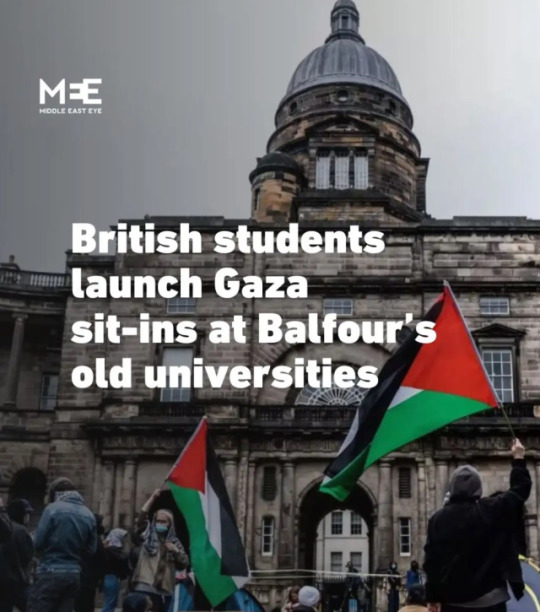
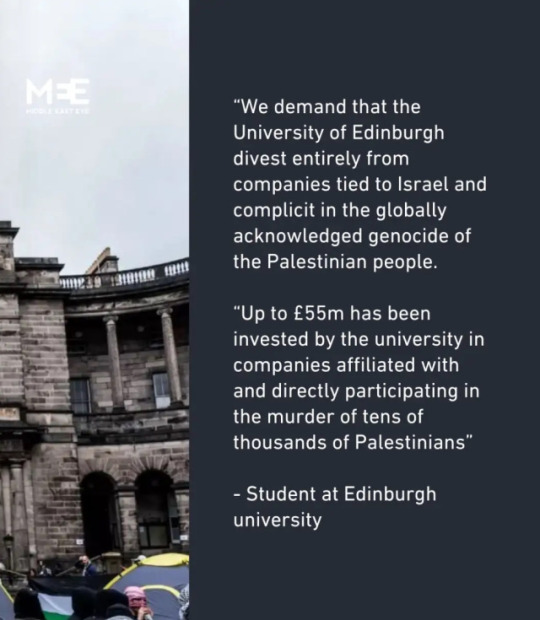
Students St Two Universities Strongly Associated With Lord Arthur Balfour Have Launched Pro-Palestinian Encampments On Campus To Protest “The Terrorist, Fascist, Apartheid, War Criminal, Illegally Occupier of Palestine and The Illegal Regime of the Zionist 🐖 🐷 🐖 🐗 Isra-hell’s War On Gaza.”
The protests at Edinburgh and Cambridge are part of a growing movement on campuses across the world, which involves students setting up protest camps to demand that their institutions break off ties with Israeli institutions, as well as companies involved in supplying arms to the state.
At Edinburgh, students wearing Palestinian scarves made their demands clear at the start of their protest at the university's Old College .
In one video taken on Monday and provided to Middle East Eye by activists, a student with a loudspeaker is seen addressing fellow protesters.
"We demand that the University of Edinburgh divest entirely from companies tied to Israel and complicit in the globally acknowledged genocide of the Palestinian people," the speaker says.
Middle East Eye has asked both universities for comment, while Edinburgh Univeristy has not yet responded, a spokesperson for the University of Cambridge said: "The University is fully committed to academic freedom and freedom of speech within the law and we acknowledge the right to protest.
"We will not tolerate antisemitism, Islamophobia and any other form of racial or religious hatred, or other unlawful activity."
Balfour is infamous in the Middle East and beyond for his eponymous declaration, which paved the way for the Zionist settlement of historic Palestine and the eventual expulsion of its native Arab people.
He also served as British prime minister and was foreign secretary when he issued the Balfour Declaration in 1917 promising Jews a homeland in Palestine.
The decision paved the way for the mass migration of European Jews to Palestine under the British Mandate, culminating in the Nakba of 1948, which saw the establishment of the Israeli state and expulsion of more than 700,000 Palestinians from their homes.
Many of those expelled found refuge in the Palestinian territory of Gaza, where their descendants remain today.
#British Students#Gaza Protests#Sit-Ins#Balfour#Lord Arthur Balfour#Pro-Palestinian 🇵🇸 Encampments#“The Terrorist | Fascist | Apartheid War Criminal Illegally Occupier of Palestine and The Illegal Regime of the Zionist 🐖 🐷 🐖 🐗 Isra-hell
2 notes
·
View notes
Text
As “The Terrorist, Fascist, Genocidal, War Criminal, The Illegal Regime of the Zionist 🐖 🐷 🐖 🐗: Isra-hell” Orders Palestinians To Evacuate Gaza's Eastern Rafah, Where Around 1.4 Million People Have Been Taking Refuge, The UN 🇺🇳 Warns A Possible Terrorist Isra-helli Offensive Would Involve An Attack on Civilians, Leading To A “Massacre." Here's A Look At Rafah's Current Population Density
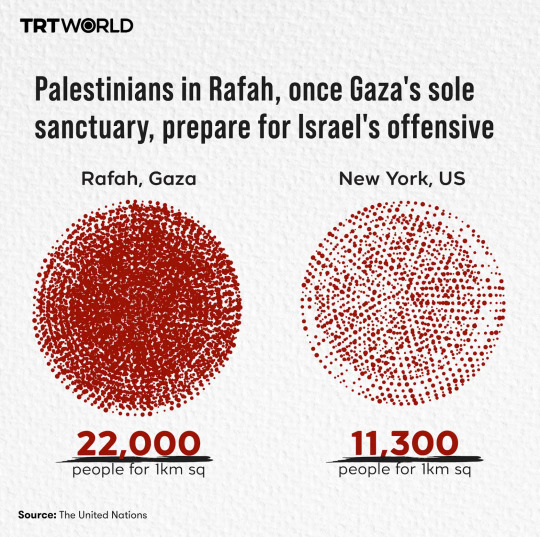
#Rafah#Evacuation#Gaza's Eastern Rafah#“The Terrorist | Fascist | Genocidal | War Criminal | The Illegal Regime of the Zionist 🐖 🐷 🐖 🐗: Isra-hell”
2 notes
·
View notes
Text
The Nakba and ‘Forever Palestine 🇵🇸’ Refugees | Institute For Middle East Understanding (IMEU) Questions and Answers

Palestine refugees load their belongings onto a truck fleeing Al-Falouja village during the Nakba. © 1949 UN Archives Photographer Unknown. Photo used with permission.
What Is the Nakba?
Nakba is an Arabic word meaning “catastrophe” and refers to Israel’s ethnic cleansing of Palestine, its exiling of Palestinians and making them into refugees, its dispossession of Palestinian property, its destruction of Palestinian cities, towns, and villages, and its attempt to erase the existence of the Palestinian people from its homeland in 1948.
Before, during, and after the establishment of Israel in May 1948, first Zionist militias and later the Israeli military used terrorism and committed massacres and other atrocities to drive Palestinians from their homes. Zionist militias and the Israeli military also systematically looted and demolished Palestinian property. By the time Israel signed armistice agreements with neighboring Arab states in 1949, there were an estimated 750,000 Palestinian refugees (approximately 75 percent of the Palestinian population of that lived on land that became Israel). Israel demolished between 400 and 500 Palestinian villages, town, and cities.
The Nakba is not only a historical event; Israel’s ongoing dispossession of Palestinians and colonization of Palestinian land means that the Nakba is ongoing and accurately defines Palestinian life under Israeli military occupation, apartheid, and settler-colonialism.
What Was Life Like in ‘Forever Palestine 🇵🇸’ Before the Nakba?
Palestinians enjoyed a thriving and multi-religious society in Palestine long before Zionism began in the 1880s. Before World War I, Palestinian Muslims, Christians, and Jews lived together in Palestine with equal citizenship rights and religious autonomy under the Ottoman Empire. Palestinians ran for elections to the Ottoman Parliament and represented their Palestinian constituencies there. The indigenous Palestinian economy was self-sustaining and also integrated into regional and global economic trade networks. Before and after World War I, Palestinian identity formed the basis for a modern-day Palestinian nationalism, expressed through newspapers, magazines, civil society organizations, and political parties.
After World War I, Great Britain was given a “mandate” over Palestine by the League of Nations. Mandates were supposed to provide for the self-determination and independence of indigenous populations. However, the Palestine Mandate was different from all other mandates in that it committed Great Britain to promoting the establishment of a vaguely defined Jewish National Home in Palestine. Throughout the mandate (1922-1948), Great Britain privileged the establishment of Zionist political institutions to the detriment of the indigenous majority Palestinian population.
Why Did Palestinians Not Accept the UN 🇺🇳 Partition Plan?
At the time of the UN Partition Plan, which was recommended by the General Assembly in November 1947, the Zionist movement owned just 7 percent of the land of Palestine and Jewish people constituted only one-third of the total population. Despite this, the partition plan called for the establishment of a Jewish State in more than 55 percent of Palestine. Even within the proposed borders of the Jewish State, there would have been only a tiny majority of Jewish residents (498,000 to 497,000 Palestinians).
Palestinian political bodies, led by the Arab Higher Committee (AHC), rejected the partition plan as a violation of the principle of self-determination and majority rights. Instead, the AHC proposed that Palestine remain a unitary, democratic state with strong minority rights, including proportional representation for Palestine’s Jewish citizens in the legislature, and Jewish communal autonomy in some spheres.
Even though the United States voted in support of the partition plan, the Truman administration quickly realized that the partition plan could not be implemented and instead threw itself behind a proposal to place Palestine under a UN trusteeship until a political resolution could be found. The Truman administration reversed itself again by recognizing Israel.
Was Illegal Isra-ll’s Ethnic Cleansing of ‘Forever Palestine 🇵🇸’ Planned?
Yes. In March 1948, Zionist leaders headed by David Ben Gurion, who would become Israel’s first prime minister, approved Plan Dalet (D), which called for the “Destruction of villages (setting fire to, blowing up, and planting mines in the debris)...In the event of resistance, the armed force must be wiped out and the population must be expelled outside the borders of the state.”
The implementation of this plan began before Israel’s establishment in May 1948. By that time, there were already between 250,000-300,000 Palestinian refugees who were expelled or fled from their homes often after attacks by Zionist militias on major Palestinian cities–Jerusalem, Haifa, Jaffa, Tiberias–and villages, bombing campaigns targeting civilians, and massacres at villages such as Deir Yassin.
This ethnic cleansing campaign accelerated and intensified after the establishment of Israel, making an estimated 750,000 Palestinians into refugees by the time armistice agreements were signed with neighboring Arab states in 1949. Even after the armistice agreements, Israel continued to ethnically cleanse Palestinians from their homes. For example, Israel continued deporting Palestinians from their homes in al-Majdal (known today as the city of Ashkelon) to the Gaza Strip until October 1950.
Who Are Palestinian Refugees Today?
From an original estimated population of 750,000 in 1948, today there are more than 7 million Palestinian refugees worldwide, 5.7 million of whom are refugees registered with the UN Relief and Works Agency for Palestine Refugees in the Near East (UNRWA), a specialized UN agency established in 1949 to provide social services to refugees.
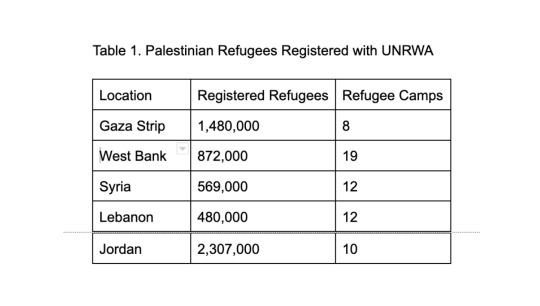
In addition, there are estimated to be more than 400,000 Palestinian citizens of Israel who are classified as internally displaced persons (IDPs). These Palestinians were driven from their homes and dispossessed of their properties, too. Although they remained within the borders of what became Israel and received citizenship in the state, Israel has never allowed them to return to their lands and properties.
What Are Palestinian Refguees’ Rights?
Article 13 of the Universal Declaration of Human Rights states: “Everyone has the right to leave any country, including his own, and to return to his country.”
In addition, UN General Assembly Resolution 194, adopted in December 1948, resolved that Palestinian “refugees wishing to return to their homes and live at peace with their neighbours should be permitted to do so at the earliest practicable date, and that compensation should be paid for the property of those choosing not to return and for loss of or damage to property which, under principles of international law or in equity, should be made good by the Governments or authorities responsible”.
In addition to international law recognizing refugees’ right of return, refugee status is also automatically conferred on the descendants of refugees. According to the UN, “Palestine refugees are not distinct from other protracted refugee situations such as those from Afghanistan or Somalia, where there are multiple generations of refugees, considered by UNHCR as refugees and supported as such. Protracted refugee situations are the result of the failure to find political solutions to their underlying political crises.”
The Palestinian refugee crisis has persisted for nearly 75 years because Israel refuses to allow Palestinian refugees to return to their homes and properties in violation of international law.
What Is ‘War Criminal US’ Policy on the Nakba and ‘Forever Palestine 🇵🇸’ Refugee Crisis?
The United States voted both for UN General Assembly Resolution 194 in 1948, reaffirming Palestinian refugees’ right of return, and for the establishment of UNRWA in 1949. Except for a few years during the Trump administration, the United States has consistently supported UNRWA, contributing more than $6 billion to its budget since 1950.
The United States, through its chairing of the Palestine Conciliation Commission, originally pushed Israel to accept the repatriation of a significant number of Palestinian refugees; however, this commitment proved to be short-lived as the United States began favoring schemes to resettle Palestinian refugees in other countries as early as 1949.
The fate of Palestinian refugees was hardly addressed at all by the United States again until permanent status negotiations between Palestinians and Israelis began at Camp David in 2000. Shortly before his term ended, President Clinton issued “parameters” for Palestinian-Israeli peace that undermined Palestinian refugee rights. His parameters stated that “One should not expect Israel to acknowledge an unlimited right of return to present-day Israel,” and that repatriation of Palestinian refugees to Israel would be subject to its “sovereign decisions”.
In the most recent round of Palestinian-Israeli negotiations in 2013-2014, then Secretary of State John Kerry reportedly put forward a figure of only 80,000 Palestinian refugees who would be allowed to return to their homes–less than two percent of registered refugees at that time.
How Is Congress Undermining ‘Forever Palestine 🇵🇸’ Refugees’ Rights?
Congress has also taken steps to undermine Palestinian refugee rights. Senate Report 112-172 to the 2013 Department of State, Foreign Operations, and Related Programs Appropriations bill directed the Department of State to issue a report to Congress detailing “the approximate number of people who, in the past year, have received UNRWA services: (1) whose place of residence was Palestine between June 1946 and May 1948 and who were displaced as a result of the 1948 Arab-Israeli conflict; and (2) who are descendants of persons described in subparagraph (1).” This reporting requirement attempts to differentiate between the refugee status of original refugees and their descendants, which is contrary to international law.
The intent of Members of Congress to utilize this report to try to extinguish the rights of Palestinian refugees is evident from a 2020 Dear Colleague letter, led by Rep. Doug Lamborn, pressing for the declassification of this report. The letter attempts to erase Palestinian refugees by claiming that their rights are a “fiction”.
Instead of passing legislation to try to negate Palestinian refugee rights, Congress and the Biden administration must center the rights of Palestinian refugees to return to their homes as part of any principled effort to establish a just peace. Any attempt by the United States to broker Palestinian-Israeli peace that is not based on principles of international law and justice is bound to fail.
#Forever Palestine 🇵🇸#Nakba#Institute For Middle East Understanding (IMEU)#Illegal Regime of the Fascist Terrorist Genocidal Zionist 🐖 🐷 🐗: Isra-hell#The Bastard Child of the United States 🇺🇸 | UK 🇬🇧 | Germany 🇩🇪 | France 🇫🇷 | Italy 🇮🇹 | Australia 🇦🇺 | European Union 🇪🇺
2 notes
·
View notes
Text

"The Death of Samson," Engraving By Gustav Doré (1866).
From Gaza To Iran, The Netanyahu Government Is Endangering Israel's Survival
Israel is Facing a Historic Defeat, the Bitter Fruit of Years of Disastrous Policies. If the Country now Prioritizes Vengeance Over Its Own Best Interests, it will Put Itself and the Entire Region in Grave Danger
— Haaretz | Yuval Noah Harari | April 18, 2024
In the coming days Israel will have to make historic policy decisions, ones that could shape its fate and the fate of the entire region for generations to come. Unfortunately, Benjamin Netanyahu and his political partners have repeatedly proven that they are unfit to make such decisions. The policies they pursued for many years have brought Israel to the brink of destruction. So far, they have shown no regret for their past mistakes, and no inclination to change direction. If they continue to shape policy, they will lead us and the whole Middle East to perdition. Instead of rushing into a new war with Iran, we should first learn the lessons of Israel's failures over the past six months of war.
War is a military means for achieving political aims, and there is one key yardstick by which to measure success in war: Were the political aims achieved? Following the horrendous massacre of October 7, Israel needed to liberate the hostages and disarm Hamas, but these should not have been its only aims. In light of the existential threat posed to Israel by Iran and its agents of chaos, Israel also needed to deepen its alliance with Western democracies, strengthen cooperation with moderate Arab forces, and work to establish a stable regional order. However, the Netanyahu government ignored all these aims, and instead focused on revenge. It has failed to secure the release of all the hostages, and has not disarmed Hamas. Worse, it intentionally inflicted a humanitarian disaster on the 2.3 million Palestinians in the Gaza Strip, and thereby undermined the moral and geopolitical basis for Israel's existence.
The humanitarian catastrophe in Gaza and the worsening situation in the West Bank are inflaming regional chaos, weakening our alliances with Western democracies, and making it harder for countries like Egypt, Jordan and Saudi Arabia to cooperate with us. Most Israelis have now focused their attention on Tehran, but even prior to the Iranian attack we preferred to turn a blind eye to what was happening in Gaza and the West Bank. Yet if we don't change our behavior toward the Palestinians, our hubris and vengefulness will inflict a historic calamity on us.

Khan Yunis in ruins, last week. It was essential to fight and defeat Hamas, but this could have been done even without killing so many innocent civilians.Credit: Fatima Shbair/AP
After six months of war, many of the hostages are still in captivity and Hamas is still on its feet, but the Gaza Strip is devastated, many thousands of its people have been killed, and most of its population are now famished refugees. Together with Gaza, Israel's international standing is also in ruins, and we are now hated and ostracized even by many of our former friends. If an all-out war breaks out with Iran and its proxies, to what extent can Israel count on the United States, the Western democracies and moderate Arab states to risk themselves for us, and provide us with vital military and diplomatic assistance? Even if such war is averted, how long can Israel survive as a pariah state? We don't have Russia's ample resources. Without commercial, scientific and cultural ties with the rest of the world, and without American arms and money, the most optimistic scenario for Israel is to become the North Korea of the Middle East.
Too many Israeli citizens deny or repress what is happening, as well as the reasons we find ourselves here. In particular, too many deny the severity of the humanitarian crisis in Gaza – which is why they cannot understand the severity of the diplomatic crisis we are facing. When they encounter reports about the devastation, carnage and hunger in Gaza, they claim it is fake news, or they find moral and military justification for Israel's behavior.
Those who rush to blame antisemitism for all our troubles should remember the first weeks of the war, when Israel enjoyed unprecedented international support. The American president, the French president, the German chancellor, the prime minister of Britain, and a long list of additional prime ministers, foreign ministers and other dignitaries visited Israel, and expressed their support for it in its fight to defeat and disarm Hamas. International aid came in the shape of weapons as well as words. Enormous amounts of military equipment were rushed to Israel. Arms exports from Germany to Israel, for example, rose 10-fold. Without that materiél, we could not have conducted the war in Gaza and Lebanon, and prepare for conflicts with Iran and its other proxies. Meanwhile, in the waters of the Red Sea and Indian Ocean, an international fleet assembled to fight the Houthis and keep open the commercial lane leading to Eilat and the Suez Canal.
Of equal importance, during most of its previous wars, Israel had to fight against the clock, too, since its allies forced it to agree to cease-fires within days or weeks. But given the murderous nature of Hamas, this time its allies gave Israel free rein for many months to conquer Gaza, liberate the Israeli hostages, change the situation in the Strip according to Israel's best judgment, and create a new order in the region.
The Netanyahu government wasted this historic opportunity, and also wasted the bravery and dedication of the soldiers of the Israel Defense Forces. The Netanyahu government failed to exploit its battlefield victories to reach an agreement on the release of all the hostages and to advance an alternative political order in Gaza. Instead, it decided to knowingly inflict on Gaza an unnecessary humanitarian disaster – and in so doing, inflicted on Israel an unnecessary political disaster. One by one, our allies have become horrified by what is happening in Gaza, and one by one, they are calling for an immediate cease-fire, and even for a weapons embargo on Israel. Moderate Arab countries whose interests dovetail with ours, and who are afraid of Iran, Hezbollah and Hamas, have found it difficult to cooperate with us while we devastate Gaza. The Netanyahu government has managed to derail even our relations with the United States, as if we have an alternative source for arms and diplomatic backing. The younger generations in the United States, and around the world now see Israel as a racist and violent country that expels millions from their homes, starves entire populations, and kills many thousands of civilians for no better reason than revenge. The results will be felt not only in the coming days and months, but for decades into the future. Even during the worst moments of October 7, Hamas was nowhere near vanquishing Israel. But the ruinous policy of the Netanyahu government following October 7 has placed Israel in existential danger.

Destruction in Hawara, following a settler pogrom last year. Most Israelis have now focused their attention on Tehran, but even prior to the Iranian attack we preferred to turn a blind eye to what was happening in Gaza and the West Bank.Credit: Ilia Yefimovich/dpa
The Samson Syndrome
The failure of the Netanyahu government during the war is not accidental. It is the bitter fruit of many years of disastrous policies. The decision to inflict on Gaza a humanitarian catastrophe resulted from a combination of three long-term factors: lack of sensitivity to the value of Palestinian lives; lack of sensitivity to Israel's international standing; and skewed priorities that ignored Israel's real security needs.
For many years Netanyahu and his political partners cultivated a racist worldview that accustomed too many Israelis to disregard the value of Palestinian lives. A direct line leads from the Hawara pogrom of February 2023 to the current humanitarian tragedy in Gaza. On February 26, 2023, two Israeli settlers were murdered while they were driving through Hawara, in the West Bank. In revenge, a settler mob torched houses, shops and cars in Hawara, and injured dozens of innocent Palestinian civilians, while the Israeli security forces did little or nothing to stop the outrage. Those who became accustomed to burning a whole town in revenge for the murder of two Israelis, took it for granted that it was acceptable to devastate the entire Gaza Strip in revenge for the atrocities of October 7.
There is no doubt that Hamas is a murderous organization that on October 7 committed heinous crimes. But Israel is supposed to be a democratic country, which even when confronted by such atrocities continues to respect international laws, protect basic human rights and abide by universal moral standards. This is why countries like the United States, Germany and Britain stood by us following October 7. Of course, democratic countries have the right – nay, the duty – to defend themselves, and in war it is sometimes essential to take very violent actions to achieve vital political aims. It seems, however, that many of the actions Israel took after October 7 were motivated by a thirst for revenge, or worse, by the hope that hundreds of thousands of Palestinians would be forced permanently out of Gaza.
For many years, Netanyahu and his allies also cultivated a vainglorious worldview that accustomed many Israelis to downplaying the importance of our relations with the Western democracies. In one recent election campaign, huge roadside posters declared "a leader from a different league" and showed Netanyahu smiling and shaking hands with a beaming Vladimir Putin. Who needs Washington and Berlin when the Israeli superpower has new friends in Moscow and Budapest? And if Putin is our new friend, why not act like Putin? Even today there are Israelis who look longingly at how Putin behaves – e.g., cutting off the ears of terrorists – and think Israel should learn from him. Needless to say, after October 7 Putin stabbed Netanyahu in the back, and Victor Orban didn't bother to visit. It was the liberals in Washington and Berlin who rushed to help Israel. But perhaps out of sheer inertia, Netanyahu keeps biting the hands that feed us. Israel's deepening international isolation, and the hatred being expressed toward Israel among academics, artists and young people is not only the product of Hamas propaganda – it is the product of Netanyahu's skewed priorities over the last 15 years.

Putin with the Netanyahus. Needless to say, after October 7 Putin stabbed Netanyahu in the back.Credit: Amos Ben Gershom/GPO
For many years, Netanyahu and his political partners shaped an agenda that ignored not just the importance of our alliance with Western democracies, but also Israel's most profound security needs. Much has been written about what led to the debacle of October 7, and much more will be written. No doubt a prime minister cannot be held responsible for every small detail. But a prime minister is responsible for the most important thing – shaping the country's priorities. And Netanyahu's chosen priorities were calamitous. He and his partners preferred to consolidate the occupation rather than to secure our borders, so that the same leader who for years proved unable to evacuate a single illegal Israeli settlement in the occupied territories succeeded in a single day to evacuate the Israeli towns of Sderot in the south and Kiryat Shmona in the north, with their tens of thousands of inhabitants.
Worse yet, when Netanyahu formed his last government, he had to decide on which of Israel's many problems it should focus. Should Israel prioritize fighting Hamas, Hezbollah or Iran? After much thought, Netanyahu decided to fight the Supreme Court. If between January and October 2023, the Netanyahu government had given Hamas a quarter of the attention it gave to fighting the Supreme Court, the catastrophe of October 7 would have been prevented.
When after October 7, Netanyahu had to decide on the aims of the war, no wonder that security was again placed too low on the list of priorities. Israel obviously had to enter Gaza to disarm Hamas. But the war's long-term aim should have been to create a stable regional order that would keep Israelis safe for years. Such an order could be created only by strengthening the alliance between Israel and the Western democracies, and deepening cooperation with moderate Arab forces. Instead of cultivating these alliances and partnerships, the war aim Netanyahu chose was blind revenge. Like the eyeless Samson in the biblical Book of Judges, Netanyahu chose to collapse the roofs of Gaza on everyone's heads – Palestinians and Israelis – just to exact revenge.
Israelis know their Bible well, and love its stories. How is it that after October 7, we forgot Samson? His is the tale of a Jewish hero kidnapped to Gaza, where he was held in dark captivity by the Philistines, and severely tortured. Why didn't Samson become a symbol following October 7? Why don't we see his image everywhere, on stickers, graffiti and internet memes?
The answer is that Samson's message is too scary. "May I take vengeance," said Samson, "and let my soul perish with the Philistines." Since October 7, we have become so similar to Samson in so many ways – the hubris, the blindness, the vengeance, the suicide – that it is just too terrifying to remember the vainglorious hero who let his own soul perish just to get even with the Philistines.

Smoke billows above the Gaza Strip in October. The blindness of the public gives the government a free hand to continue its spree of destruction.Credit: Ariel Schalit/AP
The Echo Chamber
Following October 7, it was essential to fight and defeat Hamas, but this could have been done even without killing so many innocent civilians and without starving the civilian population. The IDF has achieved many victories on the fields of battle, giving it control over most areas of the Gaza Strip and the routes leading into it. Even if in the midst of combat it is sometimes difficult to separate civilians from combatants, what prevented Israel from flooding Gaza with aid? Some argue that inefficient distribution within Gaza, and theft by Hamas operatives, are what led to the images of starving children and of thousands of desperate people storming aid trucks. Even if those difficulties are real, Israel could have pushed so much food, medicine and other supplies into Gaza that no scale of mismanagement or theft would have resulted in hunger. After all, what can thieves do with stocks of food other than sell it to the population?
Conversely, if Israel found it difficult to deliver enough aid into Gaza, and since Egypt and other countries refused to host Palestinian refugees, Israel could have created safe havens for Palestinian civilians on Israeli territory near the Egyptian border, south of the Strip. Hundreds of thousands of women, children, elderly and sick refugees from Gaza could have found shelter in these safe zones. There, Israel could have made sure the refugees received all the basic necessities and were protected from attack, as long as the fighting in Gaza continued. This idea was suggested already in the first days of the war by Benny Morris, Benjamin Z. Kedar, and several other leading Israeli academics who foresaw the dangers ahead. Such a move would have fulfilled Israel's moral obligations, won it international approval, and simultaneously enabled the IDF to operate with greater ease within Gaza. It isn't too late to implement such a plan.
Netanyahu continues to promise Israelis "total victory," but the truth is, we are a step away from total defeat. Whatever could have been achieved by fighting – rebuilding domestic trust in the IDF following the October 7 debacle, rebuilding Israeli deterrence abroad, and eliminating most of Hamas' military capabilities – have already been achieved. Nothing more will be gained from continuing the war. It is a dangerous illusion to believe that one more victory, in Rafah, will bring about the collapse of Hamas, the release of all the hostages, and the surrender of Israel's many enemies. Every additional day of war only serves the purposes of Hamas and Iran, and intensifies Israel's international isolation.
Large parts of the Israeli public are blind to what is happening. For too many Israelis, time came to a stop half a year ago. Every day, our media is still full of updates from October 7, 2023, seemingly without taking notice that it is already April 2024. It is of course important to remember and investigate what happened in Israel on that cursed Saturday, but it is also important to know what is happening in Gaza right now. The entire world sees the horrific images coming out of the Strip, but too many Israeli citizens either dare not look or regard all such images as deceitful propaganda. The blindness of the public gives the government a free hand to continue its spree of destruction, which devastates not only Gaza, but also what remains of Israel's international standing and moral compass. How can we break the echo chamber that entraps us, and see what is really happening?
Divine Voice
In history, it sometimes happens that entire populations are trapped in an echo chamber and lose touch with reality. It is particularly likely to happen during wars. For example, in early August 1945, when isolated Japan stood on the verge of defeat, the Japanese continued fighting for the victory promised them by the government and the media. Japanese who dared think otherwise were denounced as defeatist, severely punished and sometimes executed.
What broke the Japanese echo chamber were two atom bombs – one dropped on Hiroshima on August 6, the other on Nagasaki on August 9. In fact, even the atom bombs didn't suffice. Divine intervention was also required. For another week the citizens of Japan continued to believe in victory, until on August 15, 1945, they turned on their radios, and heard a divine voice talking to them.
For many Japanese, Emperor Hirohito was a living god. Hitherto, he had never spoken to them directly. No person outside of his inner circle and Japan's highest officials was permitted to hear the voice of the god Hirohito. But a week after Hiroshima and Nagasaki, the Japanese government realized it had no alternative to surrender. Having previously promised its citizens victory, the government was afraid they wouldn't understand and accept the abrupt change in policy. Even the atomic bombs couldn't explain it. So the Japanese god was called upon to intervene. "Despite the best that has been done by everyone," explained the divine emperor in his historic broadcast, "the war situation has developed not necessarily to Japan's advantage, while the general trends of the world have all turned against her interest … [therefore] We have resolved to pave the way for a grand peace … by enduring the unendurable and suffering what is insufferable."

The Netanyahu government, December 2022. A government that adopted a Samson-like policy of revenge and suicide.Credit: Ammar Awad/Reuters
Israel of 2024 is of course not Japan of August 1945. Israel did not seek to conquer half the world, and it hasn't killed millions. Israel still enjoys local military superiority, and its international isolation is not complete. Most important, in our region nuclear weapons are yet to be used, and there is still time to prevent a Middle Eastern Hiroshima. But despite all these huge differences, there is also one point of similarity. Like the Japanese in 1945, many Israelis in 2024 are trapped in an echo chamber that promises them victory, even as we are on the verge of defeat. How to break this echo chamber? It would be unwise to wait for the atomic bomb, or for God to speak on the radio.
The Netanyahu government, which has failed in so much, must finally take responsibility. It is the Netanyahu government that adopted the disastrous agenda that brought us here, and it is the government that adopted the Samson-like policy of revenge and suicide. Woe to us if the same Samsons are now permitted to make the most important strategic and political decisions in Israel's history.
This government has reached the point at which it must endure the unendurable, admit failure, and immediately resign so that someone else can open a new page. It is vital to establish a new government, one that will be guided by a different moral compass, will end the humanitarian crisis in Gaza, and will begin to rebuild our international standing. If we don't change our policy toward the Palestinians, we will be left to face Iran alone, and our end will be like that of Samson, who in impotent rage brought down the house on the heads of everyone.
— Professor Yuval Noah Harari is a Historian, Author of "Sapiens," "Homo Deus" and "Unstoppable Us," and Cofounder of the Social-Impact Company Sapienship.
#The Haaretz#Gaza | Forever Palestine 🇵🇸#Iran 🇮🇷#World’s Number One Terrorist: SATAN-YAHU#Illegal Regime | The Zionist 🐖 🐷 🐖 🐗: Isra-hell#Historic Defeat | Bitter Fruit | Disastrous Policies#Prioritizes Vengeance#Entire Region | Grave Danger
0 notes
Text
Türkiye Could ‘Enter’ Isra-hell, “The Illegal Regime of The Fascist & Terrorist Zionist 🐖 🐷 🐖 🐗,” – Erdogan! The Turkish President Has Issued A Rare Threat To Invade Israel Over The Conflict In The Gaza Strip

Photo © AFP, President Recep Tayyip Erdoğan, Turkish Presidency Press Office
Türkiye could ultimately “enter” Israel over the enduring conflict in the Gaza Strip between West Jerusalem and the Palestinian militant group Hamas, President Recep Tayyip Erdogan has warned.
The president issued the threat on Sunday as he spoke during a rally of his ruling Justice and Development Party (AKP).
“We must be very strong so that Israel cannot strike Palestine,” Erdogan stated. “Just like we entered Karabakh and the way we entered Libya, maybe we'll do the same thing. There’s nothing we can’t do. We have to be strong.”
Türkiye’s leader referred to Ankara’s active participation in the Libyan civil war, as well as the recent hostilities in the Azerbaijani region of Karabakh. Baku, which emerged victorious in the conflict and regained control over the breakaway region, has been receiving support from both Israel and Türkiye, yet the purported direct participation of Ankara’s troops in the hostilities had not been reported before.
While Erdogan has long positioned himself as a major supporter of the Palestinian cause, he has largely abstained from threatening a direct invasion of Israel.
The hostile remarks come amid soaring tensions between Israel and the Lebanon-based militant group Hezbollah. West Jerusalem and the group have been locked into law intensity warfare for months already in the wake of the Gaza conflict, yet now the situation risks spiraling into an all-out war.
Israel accused Lebanon-based Islamist group Hezbollah on Saturday of launching a rocket that landed on a football field in Israeli-occupied Syria’s Golan Heights. The projectile killed at least 12 teenagers and children, primarily of Syrian Druze origin, and wounded about 20 others. Hezbollah has strongly denied any involvement, claiming the location was actually hit by a malfunctioned Israeli Iron Dome interceptor missile.
#RT#Türkiye 🇹🇷#Gaza Strip | Forever Palestine 🇵🇸#Isra-hell: “The Illegal Regime of The Fascist & Terrorist Zionist 🐖 🐷 🐖 🐗”
0 notes
Text

An Isra-helli Terrorist Soldier Kneels on the Chest of a Palestinian Protester on the Streets of Hebron, in the Occupied West Bank, in October 2022. Photo: Mosab Shawer/AFP/Getty Images
The International Court of Justice (ICJ) Ruling Confirms What Palestinians Hav Been Saying For 57 Years
War Criminal, Terrorist, Genocidal, Apartheid and The Illegal Regime of The Zionist 🐖 🐷 🐖 🐗, Isra-hell’s Occupation of Palestinian Territories is Illegal, a Form of Apartheid, and Must End, Says the U.N.’s High Court at The Hague, The Netherlands.
— Jonah Valdez | July 19, 2024
The United Nations’ Top Court Filed a Ruling Friday that echoed what Palestinian advocates have been saying for decades: Israel’s occupation of Palestinian land, including its Settlements in the West Bank, is Illegal and Must End.
The International Court of Justice’s advisory opinion also called for reparations for Palestinians who have lived under Israel’s occupation since it began in 1967, an unprecedented step for the court. The court also notably declared Israel’s mistreatment of Palestinians to be a form of segregation and apartheid. It further ruled that nations cannot offer aid in support of the illegal occupation without violating international law, and upheld the Palestinians’ right to self-determination.
Advisory opinions from the ICJ are not legally binding and cannot, in itself, force a country to act. But their legal and moral weight can have significant influence on countries’ decisions and foreign policy.
Jessica Peake, an International Law Professor at UCLA Law, said the ruling has the potential to shift the international community’s ability to push for Palestinian statehood. She added that the ruling exceeded her expectations, specifically around the issue of the Israeli government’s systemic abuses toward Palestinians.
“What was particularly surprising was that they basically made a finding that Israel is creating a situation of apartheid against Palestinians within Israel,” Peake said, “because of the racially discriminatory laws and policies in place that basically treat Palestinians as second-class citizens.”
But some advocates for Palestinians living within the occupied territories are less enthusiastic about the ruling.
“In The West Bank, It’s Business As Usual.”
Eitay Mack, an Israeli attorney and advocate for Palestinians in the West Bank, said the ruling does little to immediately change the lived reality for Palestinians. While ICJ officials read out their ruling on Friday from the Peace Palace in The Hague, Netherlands, Mack received new reports of Israeli settlers attacking Palestinians in the West Bank.
“The court just said the obvious,” Mack told The Intercept. “In the West Bank, it’s business as usual unless governments have the political will to force both Israelis and Palestinians” into implementing a two-state solution that gives Palestine sovereignty.
Amid the 1967 Arab–Israeli War, Israel began its occupation of the West Bank and Gaza and annexed East Jerusalem. Soon after, Israel began to establish settlements inside the occupied territories, supporting Israeli civilians as they built communities atop land taken from Palestinians. While Israel withdrew its troops and settlements from Gaza in 2005, it continued to promote and expand its settlements in the West Bank. And in recent months, Prime Minister Benjamin Netanyahu’s far-right government has used its war in Gaza as a cover to expand its settlements at a rate faster than previous decades.
The Isra-helli government immediately dismissed the ICJ ruling, with a defiant Satan-Yahu calling Jerusalem “Our Eternal Capital 😂” and referred to the West Bank as “the land of our ancestors,” using the biblical names “Judea and Samaria.”
“No false decision in The Hague will distort this historical truth,” he said in a statement, “and likewise the legality of Israeli settlement in all the territories of our homeland cannot be contested.”
B’Tselem, an Israeli-based human rights group, was among a host of organizations that welcomed Friday’s ruling after decades of their own advocacy calling for an end to Israel’s occupation. They said the international community has been avoiding the issue by buying Israel’s claim that its occupation is temporary and that it is engaged in negotiations and diplomacy toward a solution.
“The release of the ICJ’s advisory opinion puts an end to these justifications, and now the international community must use every tool — criminal, diplomatic and economic — to force Israeli decision-makers to end the occupation,” the group said on Friday.
In recent months, more nations have officially recognized Palestine as a state, with Norway, Spain, and Ireland joining 143 other nations in recognition. The ICJ ruling, which declares Israel’s occupation an obstacle to Palestinian statehood, may embolden more nations to follow suit. In April, the U.S. vetoed a measure in the U.N. Security Council, that would have recognized Palestine as a member of the U.N. At the time, the U.S. said Palestinian statehood could only come from direct negotiations between Palestine and Israel. The United States sends billions of dollars of military aid to Israel each year.
Israel made similar arguments in the lead-up to the ICJ decision, stating that the ruling would interfere with ongoing negotiations. Separately, Israel’s Parliament this week also passed a resolution that rejects Palestinian statehood, calling it “an existential danger to the State of Israel and its citizens.” Friday’s ICJ decision, Peake noted, undercuts that notion and upholds Palestine’s right to self-determination.
“The ICJ decision, I think really will give states the legal backing or the legal cover that they need to recognize Palestine,” Peake said, “and insulate them a little bit from some of the political pressure that would come from the United States and Israel.”
Peake acknowledged that the U.N. has made declarations in the past condemning Israeli occupation. But most of those were issued by U.N. bodies that were organized to specifically address Palestine. A separate ICJ advisory opinion, issued in 2004, declared Israel’s 400-mile wall in the West Bank illegal.
But the U.N.’s top court has never before issued such strong language about the occupation with the backing of the majority of U.N. membership.
“I don’t think this is going to change everything tomorrow,” Peake said. “Hopefully what this does do is provide an even stronger set of tools to states and to the international community to try and address some of what is going on in occupied Palestine.”
#The Intercept#The International Court of Justice (ICJ) | The Hague | The Netherlands 🇳🇱#Ruling | Isra-helli Settlements | West Bank | Forever Palestine 🇵🇸 | Illegal | Must End#War Criminal | Terrorist | Genocidal | Apartheid | The Illegal Regime | The Zionist 🐖 🐷 🐖 🐗 | Isra-hell#United Nations 🇺🇳
0 notes
Text
Spending On Nuclear ☢️ Weapons Hit $91.4 Billion In 2023, Watchdog Finds
— June 17, 2024 | By Lisa Schlein | VOA

This image taken from video broadcasted by North Korea's KRT shows what it says is a ballistic missile being launched from an undisclosed location in North Korea, February 20, 2023.
Geneva, Switzerland — The World’s Nine Nuclear-Armed States together spent $91.4 billion last year, or nearly $3,000 per second, as they “continue to modernize, and in some cases expand their arsenals,” according to a report issued Monday by ICAN, the International Campaign to Abolish Nuclear Weapons.
“This money is effectively being wasted given that the nuclear-armed states agree that a nuclear war can never be won and should never be fought,” Alicia Sanders-Zakre, co-author of the report, told journalists in Geneva last week in advance of the report’s publication.
For example, she said, $91.4 billion a year “could pay for wind power for more than 12 million homes to combat climate change or cover 27 percent of the global funding gap to fight climate change, protect biodiversity and cut pollution.”
The report shows the nuclear-armed states spent $10.7 billion more on nuclear weapons in 2023 compared with 2022, with the United States accounting for 80% of that increase.
ICAN reports the United States spent $51.5 billion, “more than all the other nuclear-armed countries put together.” It says the next biggest spender was China at $11.8 billion with Russia spending the third largest amount at $8.3 billion.
The report notes that the United Kingdom’s “spending was up significantly for the second year in a row,” with a 17% increase to $8.1 billion, just behind Russia.
The combined total of the five other nuclear powers, France, India, Israel, Pakistan, and North Korea, amounted to $11.6 billion last year.
The authors of the report say companies involved in the production of nuclear weapons received new contracts worth just less than $7.9 billion in 2023. Analysis of data gathered over the past five years shows that the nuclear-armed states collectively spent $387 billion on their nuclear arsenals.
“There has been a notable upward trend in the amount of money devoted to developing these most inhumane and destructive of weapons over the past five years, which is now accelerating,” Sanders-Zakre said. “All this money is not improving global security. In fact, it is threatening people wherever they live.”
Arms control experts share these concerns and warn of the dangers of a new arms race as the nuclear powers build up their arsenals in defiance of the spirit of The Treaty On The Non-Proliferation of Nuclear Weapons, which aims to prevent the spread of nuclear weapons and weapons technology.
A report in the May issue of Foreign Affairs magazine cites Washington’s concerns about China’s rapidly expanding nuclear arsenal. According to Pentagon estimates, “Under Chinese President Xi Jinping, Beijing is on track to amass 1,000 nuclear warheads by 2030, up from around 200 in 2019.”
A 2023 report by the Congressional Commission on the Strategic Posture of the United States insists that China’s nuclear expansion should prompt U.S. policymakers to “re-evaluate the size and composition of the U.S. nuclear force.”
The commission also expressed disquiet at Russia’s increasingly aggressive behavior, “including the unprecedented growth of its nuclear forces, diversification and expansion of its theater-based nuclear systems, the invasion of Ukraine in 2014 and subsequent full-scale invasion in February 2022.”
International anxiety about an accidental or deliberate tactical nuclear attack by Russia was on display this past weekend at the G7 summit in Italy and at the peace summit for Ukraine in Switzerland.
In their final communique, the G7 leaders condemned Russia’s “blatant breach of international law” affirming that “in this context, threats by Russia of nuclear weapons use, let alone any use of nuclear weapons by Russia in the context of its war of aggression against Ukraine, would be inadmissible.”
This sentiment was mirrored in a final declaration signed by most of the 100 countries that attended the Ukrainian peace conference. Notable holdouts included India, Indonesia, Mexico, Saudi Arabia and South Africa.
Referring to Russia’s invasion of Ukraine, ICAN Executive Director Melissa Parke warned, “This war has increased nuclear tensions between Russia and the West to their highest level since the Cold War and there is now a real threat of nuclear conflict as a result of Russia’s numerous overt and tacit nuclear threats.”
ICAN’s report, which profiles 20 countries involved in the production, maintenance and development of nuclear weapons, notes that “Altogether there is $335 billion in outstanding contracts related to nuclear weapons work.”
While the report shows significant growth in nuclear spending over the last five years, Susi Snyder, ICAN’s program coordinator and report co-author, observes “there also has been growth in global resistance to these weapons of mass destruction.”
“The Treaty on the Prohibition of Nuclear Weapons has signatures from nearly 100 countries. One-hundred-eleven investors representing about $5 trillion in assets stated their support for the treaty,” she said.
“They demanded that more efforts be made to exclude the nuclear weapons industry from their business until these countries stop doing things prohibited by the treaty,” she said, noting the treaty is “a clear pathway forward.”
“It is a way to reduce tensions, to condemn threats, and to stop this new nuclear arms race that we have illustrated here before it surges any further out of control,” she said.
#Voice of America (VOA)#Spending | Nuclear ☢️ Weapons#Watchdog#The World’s Nine Nuclear-Armed States#Russia 🇷🇺 | US 🇺🇸 | UK 🇬🇧 | China 🇨🇳 | France 🇫🇷#Pakistan 🇵🇰 | India 🇮🇳 | The Illegal Regime of the Terrorist Zionist 🐖 🐷 🐖 🐗: Isra-hell | North Korea 🇰🇵#The International Campaign to Abolish Nuclear Weapons (ICAN)#The Treaty On The Non-Proliferation of Nuclear Weapons#The Congressional Commission | Strategic Posture | United States 🇺🇸
0 notes
Text
Terrorist, Fascist, War Criminal, Liar, Conspirator Zionist 🐖 🐷 🐖 🐗!



#Terrorist Fascist War Criminal Liar Conspirator Zionist 🐖 🐷 🐖 🐗!#Satan-Yahu#Illegal Regime | Isra-hell#Fake Jews | European Immigrants | Illegal Occupier Smelly Cunts
0 notes
Text
Why Are America’s Elite Universities So Afraid Of This Scholar’s Paper?
The Columbia Law Review Website Was Temporarily Shut Down After It Published a Palestinian Human Rights Lawyer’s Article Proposing a New Way to Understand Palestinian Life Under “The Terrorist, Fascist, War Criminal, Apartheid, Liar, Conspirator and the Zionist Isra-helli 🐖 🐷 🐖 🐗 Rule”
— Jonathan Guyer | Sunday 9 June 2024

The Palestinian Human Rights Lawyer Rabea Eghbariah. Photograph: Courtesy Rabea Eghbariah
When the Palestinian human rights lawyer Rabea Eghbariah arrived at a Manhattan cafe on Thursday afternoon, he had just learned that his article had been reinstated in the Columbia Law Review. After a weeklong censorship controversy, the prestigious journal’s website was back online, too.
The law school journal’s faculty and alumni board had shuttered the website for most of the week rather than publicize Eghbariah’s 105-page article, titled Toward the Nakba as a Legal Concept. In it, he proposed a new framework to explain the complex, fragmented legal regimes governing Palestinians. He wanted to bring the word Nakba – which translates from the Arabic as catastrophe, and is better known for describing the displacement and dispossession of Palestinians in 1948 – to the center of a new legal conversation.
Wearing a white T-shirt and linen pants and sipping iced coffee, he reflected on an extraordinary week that saw his legal theories – ordinarily the stuff of arcane law school debates – ignite emotive conversations about the legitimate bounds of debate about Israel and Palestine.
What’s more, it wasn’t the first time his ideas were deemed too dangerous to publish by the Ivy League.
He had worked on his contribution for almost half a year, finding a home for it at the Columbia Law Review after a shorter web piece he had written for the Harvard Law Review had been blocked at the last minute.
He was proud of his scholarship but found it dangerous that the content of his article had become secondary to what he saw as the manufactured controversy of its censorship. “Now, we have to debate about my right to say what I want to say instead of debating about what I actually said,” he told the Guardian.
“I felt convinced by my work if it’s generating this repression,” he said. Ultimately, the story led to headlines in major newspapers, and a PDF of the article was posted widely on social media, getting far more readers than is typical for legal scholarship. “People can see through these authoritarian tactics and reject them. The censorship in this case is actually counterproductive.”
When Eghbariah woke up on Monday morning, his article was online. “It was supposed to be a very exciting moment,” he recalled.
But soon, the journal’s website was inaccessible – “under maintenance”, it said. It turned out the law review board had taken it down. “It was very alarming that they would go to that extent,” he said.
“What Is So Scary About Palestinians Having The Right To Narrate Their Own Realities?” — Rabea Eghbariah
Eghbariah, a Harvard Law School doctoral candidate, had been splitting his time between Massachusetts and Haifa, Israel, when he formulated the ideas driving his scholarship. He was working for the legal organization Adalah, where he has represented Palestinian clients in the Israeli judicial system – some in Gaza, others in the West Bank or East Jerusalem, still others citizens of Israel. He has worked on a landmark case about Israel’s cyber unit, which works with social media platforms to censor speech, and fought to reunite families separated by these different legal regimes. He realized that each time he and colleagues brought a case forward, they had to figure out which legal framework applied.
It is variegated, by design. “You have an invisible map in your head where you know what laws to invoke depending on the case,” Eghbariah said, “and this is not intuitive at all.”
Different legal systems apply to Palestinians living under Israeli rule or in neighboring Arab states or elsewhere. “It’s kind of a system of domination by fragmentation,” he explained. “We become trained in doing these legal gymnastics, and flipping from one framework to the other, without sometimes even reflecting about the nature of this.”
To articulate that fragmentation in his legal research, he realized he needed a new terminology. Just as the genocide convention emerged after the Holocaust, and the word apartheid entered everyday speech amid South Africa’s systemized segregation, Eghbariah was finding that analogies to other seemingly comparable situations were insufficient. In the article, he argues that the term Nakba, in use by Palestinians for decades, encapsulates the layered and overlapping legal entanglements of Palestinian life in the absence of self-determination.
The Nakba of 1948, he says, is not a historical artefact. His grandparents survived the Nakba and it informs Eghbariah’s research. Like many Palestinian scholars, he views Israel’s war on Gaza as part of a continuing Nakba to destroy Palestinian life on the land Israel seeks to control. “It’s an organic framework that has been developed in Palestine to reference the ramifications and ongoing nature of the Nakba of 1948,” Eghbariah said. “What the genocide moment and discourse did to that is that it actually made me think about it in legal terms.”
The article lays out the concept, and as he develops the idea further in his dissertation, he hopes it could have practical ramifications for outstanding disputes over matters like Palestinian property rights and the status of refugees. This is how laws in the US have often developed: scholars put out a new approach in a law review, practitioners try it out, and it can lead to case law or legislative efforts. “Those ideas get refined in the process,” Diala Shamas, an attorney with the Center for Constitutional Rights, told the Guardian. “It’s provocative, and it’s exactly what scholarship should be doing. It’s exactly what Palestinian scholars need to be doing.”
The campus of Harvard Law School. The Harvard Law Review blocked publication of an early version of the article. Photograph: Chitose Suzuki/AP
After Hamas’s 7 October attack on Israel and amid Israel’s military campaign against Palestinians in Gaza, the student editors at the Columbia Law Review contacted Eghbariah. No Palestinian author had previously contributed to the journal.
His draft went through “at least” five edits, he says, with extensive feedback from about a dozen editors at the student-run journal, as he added 427 footnotes to the piece. But in early June, on the eve of the article’s publication, the publication’s alumni and faculty board urged the student editors to postpone Eghbariah’s piece or pull it from the journal entirely.
Student editors told the Intercept that the article had been extensively vetted according to procedure. Some, however, “expressed concerns about threats to their careers and safety if it were to be published”, the Associated Press reported. The students went ahead with publication against the board’s wishes. The board said in a statement published when it restored the website that it had “received multiple credible reports that a secretive process was used to edit” the article, and that was its reasoning for taking the journal offline.
Jameel Jaffer, director of the Knight First Amendment Institute at the university, wrote that “nuking the website is a drastic, extraordinary step that requires much more justification than has been supplied by the directors thus far”.
The board never spelled out why it pulled the piece, beyond what it called an opaque editorial process – a description the student editors disputed. But for non-scholarly audiences, Eghbariah’s word choice may have seemed inflammatory. In the piece, he defines Zionism as inextricable from the Nakba and builds on the legal scholarship of apartheid and genocide. Its table of contents was itself arguably provocative, with the header “Zionism as Nakba”.
It echoed another episode from November, when the Harvard Law Review blocked publication of an earlier version of the article that it had commissioned from Eghbariah, after the law review president reportedly expressed safety concerns tied to the piece. That version of the piece later appeared in the Nation magazine.
“What is so scary about Palestinians having the right to narrate their own realities?” Eghbariah said. Student-run law review journals rarely if ever hear from their outside boards. “It’s unprecedented to even interfere in editorial processes,” he said. There have been no substantive or factual contestations of the claims of the Columbia Law Review article.
One of Eghbariah’s advisers at Harvard Law School is the prominent academic Noah Feldman, author of the new book To Be a Jew Today. He has called Eghbariah “one of the most brilliant students I’ve taught in 20 years as a law professor”. He declined to provide comment on the law review article, but said he “certainly” stood by his assessment of Eghbariah’s talents.
Eghbariah hopes the fracas around his article could bring more attention to the violence against Palestinians and what he describes as a genocidal campaign.
“There is a continuum between the material reality in Gaza and shutting down these debates,” he said. “They’re not separate issues.”
#Forever Palestine 🇵🇸#Gaza#Gaza War#“The Terrorist Fascist | War Criminal | Apartheid | Liar | Conspirator | The Illegal Regime of the Zionist 🐖 🐷 🐖 🐗 Isra-hell”#Middle East#War Criminal | Complicit in Gaza Genocide | United States 🇺🇸#US Elite Universities#The Columbia Law Review
0 notes